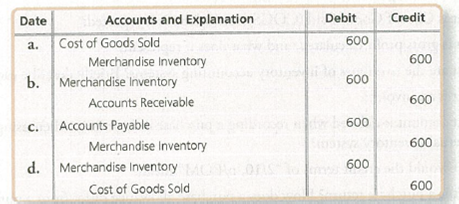
Horngren's Financial & Managerial Accounting, The Financial Chapters (6th Edition)
6th Edition
ISBN: 9780134486840
Author: Tracie L. Miller-Nobles, Brenda L. Mattison, Ella Mae Matsumura
Publisher: PEARSON
expand_more
expand_more
format_list_bulleted
Concept explainers
Textbook Question
Chapter 5, Problem 6QC
Suppose Dave’s Discounts Merchandise Inventory account showed a balance of $8,000 before the year-end adjustments. The physical count of goods on hand totaled $7,400. Dave uses a perpetual inventory system. To adjust the accounts, which entry would the company make?

Expert Solution & Answer
Trending nowThis is a popular solution!

Students have asked these similar questions
Goodwill if any is recorded at
Inventory:25000, Accounts payable:16000
Menak Industries purchases a machine at the beginning of the year at a cost of $40,000. The machine is depreciated using the straight-line method. The machine's useful life is estimated to be 10 years with a $6,000 salvage value. The book value of the machine at the end of year 3 is _.help
Chapter 5 Solutions
Horngren's Financial & Managerial Accounting, The Financial Chapters (6th Edition)
Ch. 5 - Which account does a merchandiser use that a...Ch. 5 - The two main inventory accounting systems are the...Ch. 5 - The journal entry for the purchase of inventory on...Ch. 5 - JC Manufacturing purchase d inventory for 5,300...Ch. 5 - 5. Austin Sound sold inventory for $300,000, terms...Ch. 5 - Suppose Daves Discounts Merchandise Inventory...Ch. 5 - Which of the following accounts would be closed at...Ch. 5 - What is the order of the subtotals that appear on...Ch. 5 - Prob. 9QCCh. 5 - Prob. 10QC
Ch. 5 - The journal entry for the purchase of inventory on...Ch. 5 - What is a merchandiser, and what is the name of...Ch. 5 - Prob. 2RQCh. 5 - Describe the operating cycle of a merchandiser.Ch. 5 - What is Cost of Goods Sold (COGS), and where is it...Ch. 5 - How is gross profit calculated, and what does it...Ch. 5 - What are the two types of inventory accounting...Ch. 5 - What is an invoice?Ch. 5 - What account is debited when recording a purchase...Ch. 5 - Prob. 9RQCh. 5 - What is a purchase return? How does a purchase...Ch. 5 - Prob. 11RQCh. 5 - How is the net cost of inventory calculated?Ch. 5 - What are the two journal entries involved when...Ch. 5 - Prob. 14RQCh. 5 - Prob. 15RQCh. 5 - When granting a sales allowance, is there a return...Ch. 5 - Prob. 17RQCh. 5 - Prob. 18RQCh. 5 - What are the four steps involved in the closing...Ch. 5 - Prob. 20RQCh. 5 - Prob. 21RQCh. 5 - Prob. 22RQCh. 5 - Prob. 23RQCh. 5 - Prob. 24RQCh. 5 - Prob. 25RQCh. 5 - When recording purchase returns and purchase...Ch. 5 - What account is debited when recording the payment...Ch. 5 - Prob. 28RQCh. 5 - Is an adjusting entry needed for inventory...Ch. 5 - Highlight the differences in the closing process...Ch. 5 - Describe the calculation of cost of goods sold...Ch. 5 - Comparing periodic and perpetual inventory systems...Ch. 5 - S5-2 Journalizing purchase transactions
Consider...Ch. 5 - Prob. 5.3SECh. 5 - Prob. 5.4SECh. 5 - Prob. 5.5SECh. 5 - Prob. 5.6SECh. 5 - Prob. 5.7SECh. 5 - Prob. 5.8SECh. 5 - S5-9 Journalizing closing entries
Rocky RV...Ch. 5 - Prob. 5.10SECh. 5 - Prob. 5.11SECh. 5 - Prob. 5.12SECh. 5 - Prob. 5.13SECh. 5 - Prob. 5.14SECh. 5 - Prob. 5.15SECh. 5 - Prob. 5.16SECh. 5 - Prob. 5.17SECh. 5 - Prob. 5.18ECh. 5 - Prob. 5.19ECh. 5 - Prob. 5.20ECh. 5 - Prob. 5.21ECh. 5 - Prob. 5.22ECh. 5 - Prob. 5.23ECh. 5 - Prob. 5.24ECh. 5 - Prob. 5.25ECh. 5 - Prob. 5.26ECh. 5 - Prob. 5.27ECh. 5 - Prob. 5.28ECh. 5 - Prob. 5.29ECh. 5 - Prob. 5.30ECh. 5 - Prob. 5.31ECh. 5 - E5B-32 Journalizing closing entries—periodic...Ch. 5 - E5B-33 Computing cost of goods sold in a periodic...Ch. 5 - Prob. 5.34APCh. 5 - P5-35A Journalizing purchase and sale...Ch. 5 - Prob. 5.36APCh. 5 - Prob. 5.37APCh. 5 - Prob. 5.38APCh. 5 - Prob. 5.39APCh. 5 - Prob. 5.40APCh. 5 - Prob. 5.41BPCh. 5 - Prob. 5.42BPCh. 5 - Prob. 5.43BPCh. 5 - Prob. 5.44BPCh. 5 - Prob. 5.45BPCh. 5 - Prob. 5.46BPCh. 5 - Prob. 5.47BPCh. 5 - Prob. 49CPCh. 5 - Prob. 50CPCh. 5 - P5-51 Journalizing purchase and sale transactions,...Ch. 5 - Prob. 5.1TICh. 5 - Prob. 5.1DCCh. 5 - Dobbs Wholesale Antiques makes all sales under...Ch. 5 - Rae Philippe was a warehouse manager for Atkins...Ch. 5 - Prob. 5.1FSC
Knowledge Booster
Learn more about
Need a deep-dive on the concept behind this application? Look no further. Learn more about this topic, accounting and related others by exploring similar questions and additional content below.Similar questions
- What is the cost of goods manufactured?arrow_forwardBuilding from the Module 2 Critical Thinking assignment about your company’s water purification product and Nigerian market, research the components needed to build the product. Use the following questions to guide your decisions about production and components, respond to the following topics for this week’s critical thinking assignment. What does nigeria produce and export? What does nigeria import; what are the imports used for? To what degree does nigeria have relevant and cost-effective component manufacturing capabilities? Does nigeria have relevant and cost-effective manufacturing/assembly capabilities to create products of acceptable quality? If nigeria does not have relevant component and manufacturing skills, where will the water purification components/devices be sourced from given the target country’s trade agreements? How do trade profiles and trade relationships enter into your decision about manufacturing locations? Include relevant theories and concepts related…arrow_forwardFind five credible external sources to support the ideas on the below paper and write the annotation should have two parts: a summary of the source’s main idea and conclusions, then a discussion of how you are going to use it in your Portfolio Milestone. Make sure to Create an APA7-formatted reference citation for each source. The theory in question is the Intercultural Communication Theory. This theory, according to credible sources such as the International Journal of Business Communication, is a framework for understanding and managing communication between people from different cultural backgrounds. It originated from the need to facilitate better communication and understanding in diverse settings, and has evolved to its current status as a critical tool in various fields, including business, medicine, and education. In the field of business, the Intercultural Communication Theory can help individuals better work in intercultural settings by enhancing their…arrow_forward
- Want to this question answer general accountingarrow_forwardCool Comfort currently sells 360 Class A spas, 520 Class C spas, and 230 deluxe model spas each year. The firm is considering adding a mid-class spa and expects that, if it does, it can sell 375 of them. However, if the new spa is added, Class A sales are expected to decline to 255 units while Class C sales are expected to decline to 240. The sales of the deluxe model will not be affected. Class A spas sell for an average of $13,500 each. Class C spas are priced at $7,200 and the deluxe model sells for $19,000 each. The new mid-range spa will sell for $11,000. What is the value of erosion? General Accountingarrow_forwardStep by step solutionarrow_forward
- Answer? ? General accounting questionarrow_forwardStock acquisition is 950000,book value of acquired company is 700000arrow_forwardThe following information is available for Betty DeRose, Inc.: Accounts payable Inventory January 1, 2012 December 31, 2012 $70,000 $55,000 $88,000 $79,000 Betty DeRose reported $145,000 of cash paid to suppliers for purchases of inventory in its 2012 cash flow statement. Calculate Betty's cost of goods sold for 2012.arrow_forward
- Rock Corporation sells its product for $16 per unit. Next year, fixed expenses are expected to be $454,000 and variable expenses are expected to be $9 per unit. How many units must the company sell to generate a net operating income of $92,000?arrow_forwardCool Comfort currently sells 360 Class A spas, 520 Class C spas, and 230 deluxe model spas each year. The firm is considering adding a mid-class spa and expects that, if it does, it can sell 375 of them. However, if the new spa is added, Class A sales are expected to decline to 255 units while Class C sales are expected to decline to 240. The sales of the deluxe model will not be affected. Class A spas sell for an average of $13,500 each. Class C spas are priced at $7,200 and the deluxe model sells for $19,000 each. The new mid-range spa will sell for $11,000. What is the value of erosion? Answerarrow_forwardWaiting for your solutionarrow_forward
arrow_back_ios
SEE MORE QUESTIONS
arrow_forward_ios
Recommended textbooks for you
 College Accounting, Chapters 1-27AccountingISBN:9781337794756Author:HEINTZ, James A.Publisher:Cengage Learning,
College Accounting, Chapters 1-27AccountingISBN:9781337794756Author:HEINTZ, James A.Publisher:Cengage Learning, Financial AccountingAccountingISBN:9781337272124Author:Carl Warren, James M. Reeve, Jonathan DuchacPublisher:Cengage Learning
Financial AccountingAccountingISBN:9781337272124Author:Carl Warren, James M. Reeve, Jonathan DuchacPublisher:Cengage Learning Cornerstones of Financial AccountingAccountingISBN:9781337690881Author:Jay Rich, Jeff JonesPublisher:Cengage Learning
Cornerstones of Financial AccountingAccountingISBN:9781337690881Author:Jay Rich, Jeff JonesPublisher:Cengage Learning- Century 21 Accounting Multicolumn JournalAccountingISBN:9781337679503Author:GilbertsonPublisher:Cengage
 Financial And Managerial AccountingAccountingISBN:9781337902663Author:WARREN, Carl S.Publisher:Cengage Learning,
Financial And Managerial AccountingAccountingISBN:9781337902663Author:WARREN, Carl S.Publisher:Cengage Learning,

College Accounting, Chapters 1-27
Accounting
ISBN:9781337794756
Author:HEINTZ, James A.
Publisher:Cengage Learning,

Financial Accounting
Accounting
ISBN:9781337272124
Author:Carl Warren, James M. Reeve, Jonathan Duchac
Publisher:Cengage Learning

Cornerstones of Financial Accounting
Accounting
ISBN:9781337690881
Author:Jay Rich, Jeff Jones
Publisher:Cengage Learning

Century 21 Accounting Multicolumn Journal
Accounting
ISBN:9781337679503
Author:Gilbertson
Publisher:Cengage


Financial And Managerial Accounting
Accounting
ISBN:9781337902663
Author:WARREN, Carl S.
Publisher:Cengage Learning,
Chapter 6 Merchandise Inventory; Author: Vicki Stewart;https://www.youtube.com/watch?v=DnrcQLD2yKU;License: Standard YouTube License, CC-BY
Accounting for Merchandising Operations Recording Purchases of Merchandise; Author: Socrat Ghadban;https://www.youtube.com/watch?v=iQp5UoYpG20;License: Standard Youtube License